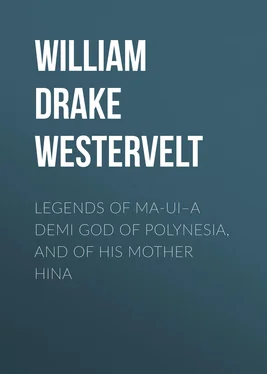William Drake Westervelt - Legends of Ma-ui–a demi god of Polynesia, and of his mother Hina
Здесь есть возможность читать онлайн «William Drake Westervelt - Legends of Ma-ui–a demi god of Polynesia, and of his mother Hina» — ознакомительный отрывок электронной книги совершенно бесплатно, а после прочтения отрывка купить полную версию. В некоторых случаях можно слушать аудио, скачать через торрент в формате fb2 и присутствует краткое содержание. Жанр: foreign_antique, Старинная литература, Мифы. Легенды. Эпос, на английском языке. Описание произведения, (предисловие) а так же отзывы посетителей доступны на портале библиотеки ЛибКат.
- Название:Legends of Ma-ui–a demi god of Polynesia, and of his mother Hina
- Автор:
- Жанр:
- Год:неизвестен
- ISBN:нет данных
- Рейтинг книги:3 / 5. Голосов: 1
-
Избранное:Добавить в избранное
- Отзывы:
-
Ваша оценка:
- 60
- 1
- 2
- 3
- 4
- 5
Legends of Ma-ui–a demi god of Polynesia, and of his mother Hina: краткое содержание, описание и аннотация
Предлагаем к чтению аннотацию, описание, краткое содержание или предисловие (зависит от того, что написал сам автор книги «Legends of Ma-ui–a demi god of Polynesia, and of his mother Hina»). Если вы не нашли необходимую информацию о книге — напишите в комментариях, мы постараемся отыскать её.
Legends of Ma-ui–a demi god of Polynesia, and of his mother Hina — читать онлайн ознакомительный отрывок
Ниже представлен текст книги, разбитый по страницам. Система сохранения места последней прочитанной страницы, позволяет с удобством читать онлайн бесплатно книгу «Legends of Ma-ui–a demi god of Polynesia, and of his mother Hina», без необходимости каждый раз заново искать на чём Вы остановились. Поставьте закладку, и сможете в любой момент перейти на страницу, на которой закончили чтение.
Интервал:
Закладка:
But Hina the mother saw the struggle of her sacred bird and hastened to the rescue. She caught a wing of the bird, but could not pull the Alae from the sacred hook. The wing was torn off. Then the fish gathered around the bait and tore it in pieces. If the bait could have been kept entire, then the land would have come up in a continent rather than as an island. Then the Hawaiian group would have been unbroken. But the bait broke—and the islands came as fragments from the under world.
Maui's hook and canoe are frequently mentioned in the legends. The Hawaiians have a long rock in the Wailuku river at Hilo which they call Maui's canoe. Different names were given to Maui's canoe by the Maoris of New Zealand. "Vine of Heaven," "Prepare for the North," "Land of the Receding Sea." His fish hook bore the name "Plume of Beauty."
On the southern end of Hawke's Bay, New Zealand, there is a curved ledge of rocks extending out from the coast. This is still called by the Maoris "Maui's fish-hook," as if the magic hook had been so firmly caught in the jaws of the island that Maui could not disentangle it, but had been compelled to cut it off from his line.
There is a large stone on the sea coast of North Kohala on the island of Hawaii which the Hawaiians point out as the place where Maui's magic hook caught the island and pulled it through the sea.
In the Tonga Islands, a place known as Hounga is pointed out by the natives as the spot where the magic hook caught in the rocks. The hook itself was said to have been in the possession of a chief-family for many generations.
Another group of Hawaiian legends, very incomplete, probably referring to Maui, but ascribed to other names, relates that a fisherman caught a large block of coral. He took it to his priest. After sacrificing, and consulting the gods, the priest advised the fisherman to throw the coral back into the sea with incantations. While so doing this block became Hawaii-loa. The fishing continued and blocks of coral were caught and thrown back into the sea until all the islands appeared. Hints of this legend cling to other island groups as well as to the Hawaiian Islands. Fornander credits a fisherman from foreign lands as thus bringing forth the Hawaiian Islands from the deep seas. The reference occurs in part of a chant known as that of a friend of Paao—the priest who is supposed to have come from Samoa to Hawaii in the eleventh century. This priest calls for his companions:
"Here are the canoes. Get aboard.
Come along, and dwell on Hawaii with the green back.
A land which was found in the ocean,
A land thrown up from the sea—
From the very depths of Kanaloa,
The white coral, in the watery caves,
That was caught on the hook of the fisherman."
The god Kanaloa is sometimes known as a ruler of the under-world, whose land was caught by Maui's hook and brought up in islands. Thus in the legends the thought has been perpetuated that some one of the ancestors of the Polynesians made voyages and discovered islands.
In the time of Umi, King of Hawaii, there is the following record of an immense bone fish-hook, which was called the "fish-hook of Maui:"
"In the night of Muku (the last night of the month), a priest and his servants took a man, killed him, and fastened his body to the hook, which bore the name Manai-a-ka-lani, and dragged it to the heiau (temple) as a 'fish,' and placed it on the altar."
This hook was kept until the time of Kamehameha I. From time to time he tried to break it, and pulled until he perspired.
Peapea, a brother of Kaahumanu, took the hook and broke it. He was afraid that Kamehameha would kill him. Kaahumanu, however, soothed the King, and he passed the matter over. The broken bone was probably thrown away.
III
MAUI LIFTING THE SKY
Maui's home was for a long time enveloped by darkness. The heavens had fallen down, or, rather, had not been separated from the earth. According to some legends, the skies pressed so closely and so heavily upon the earth that when the plants began to grow, all the leaves were necessarily flat. According to other legends, the plants had to push up the clouds a little, and thus caused the leaves to flatten out into larger surface, so that they could better drive the skies back and hold them in place. Thus the leaves became flat at first, and have so remained through all the days of mankind. The plants lifted the sky inch by inch until men were able to crawl about between the heavens and the earth, and thus pass from place to place and visit one another.
After a long time, according to the Hawaiian legends, a man, supposed to be Maui, came to a woman and said: "Give me a drink from your gourd calabash, and I will push the heavens higher." The woman handed the gourd to him. When he had taken a deep draught, he braced himself against the clouds and lifted them to the height of the trees. Again he hoisted the sky and carried it to the tops of the mountains; then with great exertion he thrust it upwards once more, and pressed it to the place it now occupies. Nevertheless dark clouds many times hang low along the eastern slope of Maui's great mountain—Haleakala—and descend in heavy rains upon the hill Kauwiki; but they dare not stay, lest Maui the strong come and hurl them so far away that they cannot come back again.
A man who had been watching the process of lifting the sky ridiculed Maui for attempting such a difficult task. When the clouds rested on the tops of the mountains, Maui turned to punish his critic. The man had fled to the other side of the island. Maui rapidly pursued and finally caught him on the sea coast, not many miles north of the town now known as Lahaina. After a brief struggle the man was changed, according to the story, into a great black rock, which can be seen by any traveler who desires to localize the legends of Hawaii.
In Samoa Tiitii, the latter part of the full name of Mauikiikii, is used as the name of the one who braced his feet against the rocks and pushed the sky up. The foot-prints, some six feet long, are said to be shown by the natives.
Another Samoan story is almost like the Hawaiian legend. The heavens had fallen, people crawled, but the leaves pushed up a little; but the sky was uneven. Men tried to walk, but hit their heads, and in this confined space it was very hot. A woman rewarded a man who lifted the sky to its proper place by giving him a drink of water from her cocoanut shell.
A number of small groups of islands in the Pacific have legends of their skies being lifted, but they attribute the labor to the great eels and serpents of the sea.
One of the Ellice group, Niu Island, says that as the serpent began to lift the sky the people clapped their hands and shouted "Lift up!" "High!" "Higher!" But the body of the serpent finally broke into pieces which became islands, and the blood sprinkled its drops on the sky and became stars.
One of the Samoan legends says that a plant called daiga, which had one large umbrella-like leaf, pushed up the sky and gave it its shape.
The Vatupu, or Tracey Islanders, said at one time the sky and rocks were united. Then steam or clouds of smoke rose from the rocks, and, pouring out in volumes, forced the sky away from the earth. Man appeared in these clouds of steam or smoke. Perspiration burst forth as this man forced his way through the heated atmosphere. From this perspiration woman was formed. Then were born three sons, two of whom pushed up the sky. One, in the north, pushed as far as his arms would reach. The one in the south was short and climbed a hill, pushing as he went up, until the sky was in its proper place.
The Gilbert Islanders say the sky was pushed up by men with long poles.
The ancient New Zealanders understood incantations by which they could draw up or discover. They found a land where the sky and the earth were united. They prayed over their stone axe and cut the sky and land apart. "Hau-hau-tu" was the name of the great stone axe by which the sinews of the great heaven above were severed, and Langi (sky) was separated from Papa (earth).
Читать дальшеИнтервал:
Закладка:
Похожие книги на «Legends of Ma-ui–a demi god of Polynesia, and of his mother Hina»
Представляем Вашему вниманию похожие книги на «Legends of Ma-ui–a demi god of Polynesia, and of his mother Hina» списком для выбора. Мы отобрали схожую по названию и смыслу литературу в надежде предоставить читателям больше вариантов отыскать новые, интересные, ещё непрочитанные произведения.
Обсуждение, отзывы о книге «Legends of Ma-ui–a demi god of Polynesia, and of his mother Hina» и просто собственные мнения читателей. Оставьте ваши комментарии, напишите, что Вы думаете о произведении, его смысле или главных героях. Укажите что конкретно понравилось, а что нет, и почему Вы так считаете.












